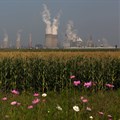The Omnia Group has signed a Memorandum of Understanding (MoU) with WKN Windcurrent to evaluate the onsite production of green hydrogen and ammonia at Omnia's Sasolburg plant in the Free State. JSE-listed Omnia manufactures and supplies chemicals for the agriculture, mining and chemicals application industries.

Seelan Gobalsamy, CEO of Omnia, and Markus Lesser, CEO of PNE, sign the MoU to evaluate the onsite production of green hydrogen and ammonia at Omnia’s Sasolburg plant. WKN Windcurrent is a subsidiary of PNE.
Speaking at the signing on Tuesday, 31 January, Omnia CEO Seelan Gobalsamy said the MoU marked a significant milestone for the business as ammonia serves as a key ingredient in the production of ammonium nitrate fertilisers for the agriculture sector and in explosives manufacturing for the mining industry.
"Ultimately, the MoU shows our commitment to a more sustainable, greener future with ammonia that's better for us, better for future generations and better for the world," he said.
The business currently utilises a hybrid supply of ammonia, with 50% being imported and the other half sourced from Sasol, explained Jona Pillay, group executive: manufacturing, operations and supply chain at Omnia. However, as the organisation shifts towards decarbonisation and carbon-neutrality, it has had to rethink its ammonia sources and how it is produced.
Describing how the potential ammonia plant might be powered, Pillay said that external to the plant, Omnia is looking at 100MW fed into the facility through the combined use of wind and solar energy, developed by WKN Windcurrent — a subsidiary of Germany-based energy project developer PNE. Powering the plant internally, including the electrolysis process, it is considering a 40-50MW solar plant.
Yershen Pillay 20 Dec 2022 Potential for total shift to green ammonia
Omnia aims to produce 100,000 tonnes of green ammonia per annum, meeting 30-35% of its current needs, with the goal of expanding on this in the future.
"We're going to reduce our dependency on the carbonised supply of ammonia, and we, hopefully, will go through a total shift to green ammonia," said Pillay.
"This aligns with Omnia's strategy of building a sustainable future for our operations, our customers, and all the stakeholders around us," he said.
Sasolburg solar plant
Omnia also recently launched a 5MW solar plant in Sasolburg which it expects to generate close to 10,500MWh a year, saving the business at least R12m per annum in energy costs. It also broke ground on the second phase of the development which will see 11,000 more solar panels added.
Together with its ability to produce electricity from excess process steam from its nitric acid plants (co-generation), the solar plant development will supplement between 25-35% of Omnia’s electricity needs at its Sasolburg operations.





































